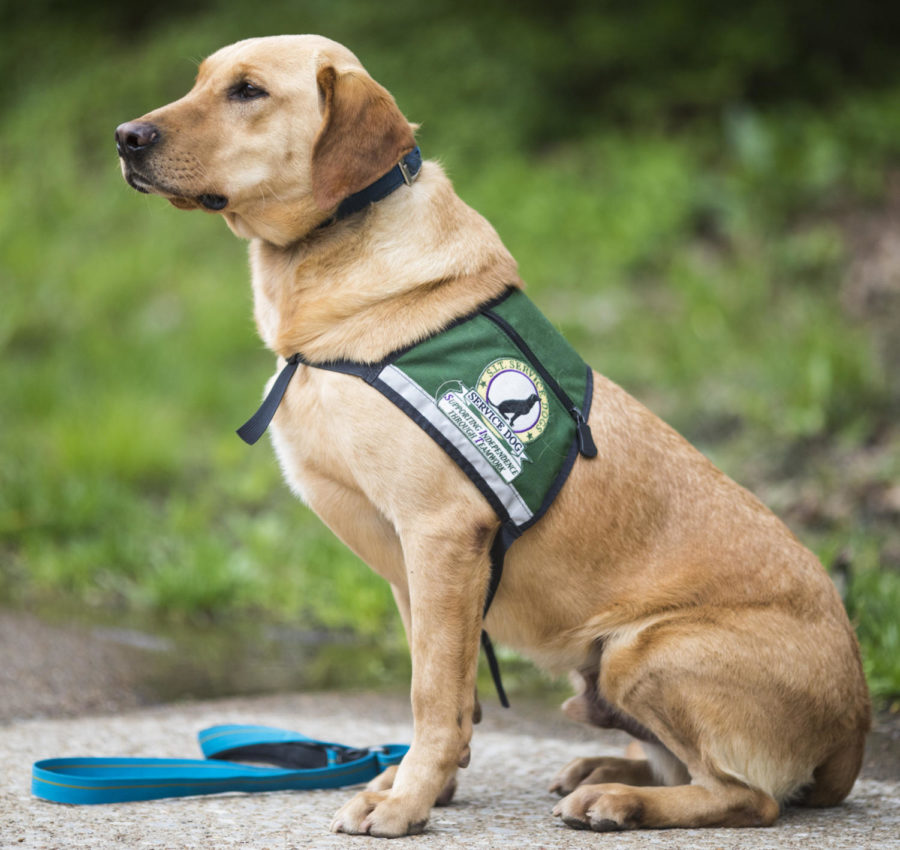Service dogs to help students de-stress during ‘Dawgs and Dogs’
Freddy, a two-year old yellow lab, looks onward to her trainer Wednesday, April 25, 2018, outside of the Agriculture building. “My favorite part of working with these dogs is that I get a chance to change someones life for the better,” said Casey Buchanan, Freddy’s hander from S.I.T. Service Dogs. (Corrin Hunt | @CorrinIHunt)
May 3, 2018
Morris Library on May 3 and 4 will have trained service dogs from SIT Service Dogs to help students take a break from the stress of finals.
The dogs will be in the library’s browsing room from 10 a.m. to 3 p.m. on both days.
This event will be organized by SIT Service Dogs, a service dog company based in Ava, in partnership with SIU’s Saluki Service Dawgs RSO.
Advertisement
“[SIT partners with] the students in Saluki Service Dawgs to help them train their service dogs to be placed nationwide,” Service Dawgs President Lauren Murray, a junior studying forestry, said.
The Dawgs and Dogs event is one of SIT’s community outreach events and is meant to help students de-stress before finals Murray said.
“There’s a lot of research and studies shown on the relationship that dogs and people have and how even just petting a dog for a few minutes can really calm a person down,” Murray said. “[SIT] bring[s] in their younger litters, so they get some of that socializing experience, but then also the students benefit because [they get] to destress from sitting for finals and the end of the semester.”
Members of Saluki Service Dawgs work with the dogs on campus during the week.
“We teach them their basic commands and then anything else they need to know,” member Sydney Connolly, a sophomore majoring in social work said. “It helps [SIT] because they have more trainers available to train the dogs, and it allows the dogs to be more around people.”
Members take the dogs around campus to places like the Student Center and classes.
“Some dogs are going to younger children, so [taking them to classes gets] them accustomed to school, how a school kind of works, like sitting through class periods and [having] commotion around,” Connolly said. “It’s just another way to get the dogs desensitized to the public, so they can focus on their handler.”
Advertisement*
Murray said having the dogs working with SIU students is beneficial for SIT and allows the dogs to socialize and be trained.
“I think it’s also good for students on campus who aren’t in the club to [become] educated on what a service dog is and how important they are and how important it is to not distract them from the job they’re doing,” Murray said.
Before beginning to work with the dogs, members of Saluki Service Dawgs have to go through training.
“When you first join the club, you spend a semester in like class, basically,” Connolly said. “You learn the commands, you learn about different laws that protect you as a trainer, you learn about what [SIT does] with the service dogs, like which dogs they train, and then you start getting hands-on, like teach[ing] them how to sit [and] how to teach them to go down.”
At the end of the semester members take a public access test before starting to work with the dogs.
“If you pass [the public access test], then that allows you to be able to take the dogs to campus and start training them yourself,” Connolly said.
The dogs also have to pass a public access evaluation but first they have to go through rigorous training. Most of the dogs SIT trains were bred by the company Murray said.
When the dogs get a little older, they move on to the next step in their training – therapy training.
Therapy training is the initial process of desensitizing the training service dogs Murray said.
“They are acting as therapy dogs, getting used to people being around them and not startled by things, and then they themselves go through public access training,” Murray said. “So where we have our students go through and make sure that they can handle different situations and things that arise, the dogs go through the same thing.”
The dogs learn the basic commands of sitting, waiting and keeping a focus on their trainer so when they are in public they will behave themselves.
The public access training and evaluations are based on standards set out by Assistance Dogs International Murray said. Assistance Dogs International is a worldwide organization made up of many smaller organizations that train and place service dogs.
“SIT places seizure response dogs, mobility assistance dogs, medical alert dogs, and then service dogs for traumatic brain injury or other neurological issues,” Murray said.
Each of the dogs is trained for a specific type of work.
Medical alert dogs are trained to detect when their handler’s blood sugar is low based off of scent. Some dogs are trained specifically to work with children with autism.
All dogs trained by SIT are paired with clients based on needs and on personality.
Pairing dogs with trainers works in a similar way, in that trainers are matched with dogs based on personalities.
“Lex and Daniel, the people who own [SIT], they’ll pair you up with a dog who they think you’ll work best with,” Connolly said. “It’s a lot of guesswork, so you just spend the semester with the dog, and if it doesn’t work out for you, [because] sometimes your personality and the dog’s personality doesn’t match… then you switch dogs.”
Joining Saluki Service Dawgs isn’t difficult Connolly said. The best time to join is in semester since that is when they start training new members.
“It’s a lot of fun,” Connolly said. “It gets stressful, it does, because they’re dogs, sometimes they don’t listen, sometimes they refuse to listen because they want to get away with things, but overall it’s really fun. It’s really rewarding.”
For more information on SIT Service Dogs or Saluki Service Dawgs, like the SIT Service Dogs Facebook page or email Lauren Murray at lrmurray14@siu.edu.
Staff writer Rana Schenke can be reached at rschenke@dailyegyptian.com.
To stay up to date with all your southern Illinois news, follow the Daily Egyptian on Facebook and Twitter.
Advertisement










